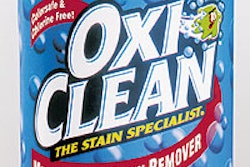Until this year, Chico, CA-based Duckback Products used a fairly labor-intensive process to mark the corrugated shipping cases it uses to ship four 1-gal containers of wood and concrete coatings and cleaners. For each box, a 10¢ label was used. On top of that label cost, an employee had to run the printed paper label over a glue roller and then hand-apply the glued label to the case.
As its number of stockkeeping units grew, Duckback sought an alternative to reduce its labor cost and speed the printing process. In 2001, the company invested in a Model 2481 flexo flat-case printer from Kiwi Coders (Wheeling, IL). The machine prints company name, product name, logo, batch code, and date code onto a flat corrugated shipping blank.
The addition “is saving us $17귔 a year in labor costs by automatically printing each case,” says Larry Leiber, the company’s purchasing agent. “And it’s freed up a person so that he can handle the knocked-down cases and tend to other jobs as necessary.”
Comparing the two case marking methods, Leiber estimates that “with the former method, it took us nearly an hour and a half to do a batch of 250 cases. Now we do it in 10 minutes.”
Labor savings aren’t the sole benefit, either. Leiber says it costs about 3¢ to print a case, less than a third of the cost of the previous box label.
How it works
Leiber explains that Duckback’s products are seasonal, with winter being a slower time. It was during that time, in early 2002, that the company began running the Kiwi machine to build inventory for the busier seasons.
“We print about 300ꯠ cases per year on the machine right now,” he explains. “We usually fire it up first thing in the morning and run the batches for that day’s production. The machine is used five days a week, but depending on our case printing needs, we may only run it for an hour or two. Occasionally we’ll use it late in the afternoon to run the next day’s batches as well.”
At the infeed side of the machine, KD case blanks are stacked in a magazine on a conveyor. The magazine holds about 75 blanks. Duckback uses 200#-test, C-flute corrugated cases in two sizes: a top-loading case with inside dimensions of 13¾”x13¾”x7½”, and a side-loading case with inside dimensions of 13½”x7½”x13½”. The print area on the case is 14”Lx7”H.
Lugs on a plate chain beneath the conveyor are positioned 48” apart. One lug “strips” the blank from the bottom of the stack. The lug carries it about 2’ into the machine, and as the print cylinder in the machine rotates, it transfers the imprint to the case. The print cylinder’s 48”-circumference matches that of the incoming conveyor, which maintains the machine’s timing for this function.
The flexographic printer uses an ink system in which one roller picks up the water-based ink from a tank, while a second roller picks up a uniform thickness of ink. This second roller transfers the ink to the rubber type on the thin flexible plastic plate (or sheet) that’s wrapped around the print cylinder. Supplied by Banner Moulded Products (River Grove, IL), the sheet is attached to Kiwi’s Flexback printing cylinder.
Enhancing the system for Duckback Products, the plate allows use of the RIBtype® system from United RIBtype Co. (Fort Wayne, IN). In the RIBtype system, ribs on the back of the type interlock with ribs on the marking device. That allows for fast changes of text.
The Kiwi printer accommodates production from Duckback’s highest-volume packaging line that fills products into 1-gal high-density polyethylene bottles and metal containers. The line, which Leiber says includes no new equipment, accounts for 40% to 45% of the company’s volume.
Four of the containers are hand-loaded into the manually erected and printed cases. Pallet loads are shipped to a network of distributors that supply more than 3귔 independent retail outlets. The stains, coatings, and cleaning goods are marketed under the brand names Superdeck and Mason’s Select.
The Kiwi unit is designed to imprint up to 50 cases/min, though Leiber says Duckback runs the machine at about half that speed. Although speed isn’t a key concern, the company benefits from the professional-looking printing and the ability to quickly change type with the slug system in-house and on demand. Add to those benefits an eight-month payback, and it’s easy to understand why Leiber says “we’ve been really happy with the machine—it’s been great.” —JB


























